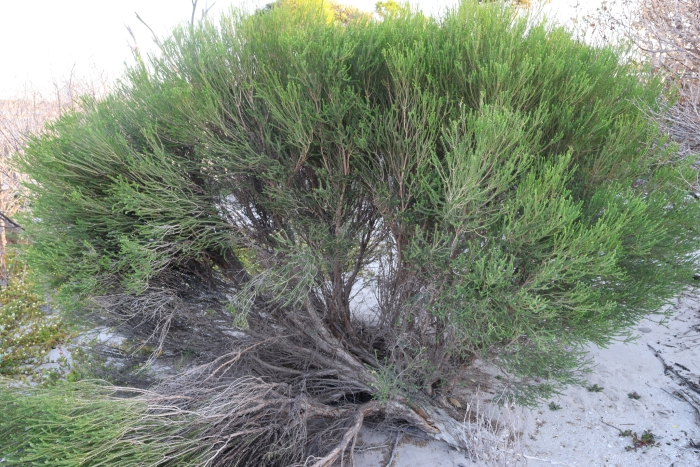Mallee Honey-Myrtle
(Melaleuca brevifolia)
Mallee Honey-Myrtle (Melaleuca brevifolia)
/
/

© Greg Tasney
CC BY-SA 4.0
Image By:
© Greg Tasney
Recorded By:
Copyright:
CC BY-SA 4.0
Copyright Notice:
Photo by: © Greg Tasney | License Type: CC BY-SA 4.0 | License URL: http://creativecommons.org/licenses/by-sa/4.0/ | Uploader: gregtasney | Publisher: iNaturalist |



























Estimated Native Range
Summary
Melaleuca brevifolia, commonly known as Mallee Honey-myrtle or Short-leaf Honey-myrtle, is a shrub or small tree native to the mallee regions of Australia, including western Victoria, southeastern South Australia, and southwestern Western Australia. It is adapted to grow in semi-arid environments, often found in mallee scrub, a type of vegetation characterized by multi-stemmed eucalypts and diverse understory species. This plant typically reaches up to 13 feet in height and is notable for its rough, corky bark and dense foliage. The white to yellowish flowers, which appear on the previous season’s growth, are not particularly showy but are attractive to bees and other pollinators. Flowering occurs mainly in spring and summer. The fruits are small, cup-shaped woody capsules that can persist on the plant.
Mallee Honey-myrtle is valued for its ability to withstand harsh conditions, making it suitable for cultivation in areas with salty soils or those containing limestone. It is a moderately hardy garden plant that requires good drainage and thrives in a sunny position. In landscaping, it can be used for screening, windbreaks, or as a feature plant in water-wise gardens. While it is relatively low-maintenance, it may benefit from occasional pruning to maintain a desired shape and promote denser growth. It is also known for its resilience to pests and diseases, making it a reliable choice for gardeners. This species is not considered threatened, indicating a stable population in its native habitat.CC BY-SA 4.0
Mallee Honey-myrtle is valued for its ability to withstand harsh conditions, making it suitable for cultivation in areas with salty soils or those containing limestone. It is a moderately hardy garden plant that requires good drainage and thrives in a sunny position. In landscaping, it can be used for screening, windbreaks, or as a feature plant in water-wise gardens. While it is relatively low-maintenance, it may benefit from occasional pruning to maintain a desired shape and promote denser growth. It is also known for its resilience to pests and diseases, making it a reliable choice for gardeners. This species is not considered threatened, indicating a stable population in its native habitat.CC BY-SA 4.0
Plant Description
- Plant Type: Shrub, Tree
- Height: 1.5-9 feet
- Width: 3-5 feet
- Growth Rate: Moderate
- Flower Color: White
- Flowering Season: Spring, Summer
- Leaf Retention: Evergreen
Growth Requirements
- Sun: Full Sun, Part Shade
- Water: Medium
- Drainage: Medium
Common Uses
Bee Garden, Bird Garden, Butterfly Garden, Hedges, Low Maintenance, Water Garden
Natural Habitat
Native to mallee regions of Australia, often found in mallee scrub environments
Other Names
Common Names: Short-leaved Honey-myrtle, D’Alton’s Melaleuca
Scientific Names: , Melaleuca brevifolia, Melaleuca fasciculiflora, Melaleuca neglecta, Melaleuca oraria, Myrtoleucodendron fasciculiflorum,
GBIF Accepted Name: